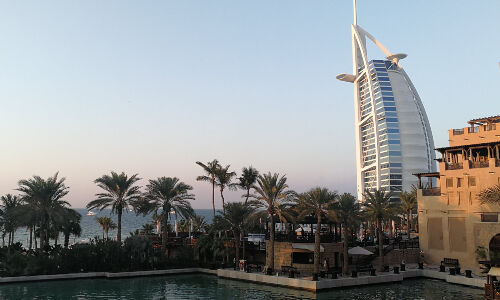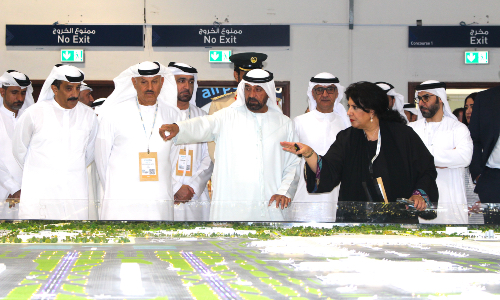Travel Boom in the Gulf Fuels Financial Sector
The oil monarchies as tourism magnets. What once sounded like utopia is now a key part of the sheikhs’ strategy to reduce their dependency on black gold. For the financial sector, the Middle East’s expansion of aviation and hospitality spells good business—though not for all market participants.
Written by Gérard Al-Fil, Dubai
The Emirate of Dubai welcomed 5.31 million travelers in the first quarter of 2025, a 3 percent increase year-on-year. Neighboring Saudi Arabia saw a 69 percent increase in tourism from 2019 to 2024—the highest growth among G20 countries.
«The strong position of the Middle East in global tourism is underscored by projections that international arrivals will grow by 13 percent annually through 2030, and outbound business travel by 9 percent per year,» said a study by Tourism Economics, published by the Arabian Travel Market (Dubai). It adds: «Business travel in the Middle East is growing 1.5 times faster than the global average.»
This is reason enough for domestic and foreign banks and insurers to develop and implement financing solutions for the tourism industry. From jumbo loans for stadiums and bond placements for airlines to leasing models for beachfront bungalows and trip cancellation insurance for families – demand across the financial product spectrum is soaring.
Billions for Air Travel
The four largest airlines in the region – Emirates, Etihad Airways, Qatar Airways, and Saudia – have ordered nearly 780 aircraft from Boeing and Airbus for delivery over the next five years. Emirates prefers to issue bonds. A $750 million bond placed in 2013 with a 12-year term managed by Deutsche Bank AG and Morgan Stanley, among others, was paid back on time in the 2024/2025 fiscal year ending March 31.
Now, CEO Sheikh Ahmed Bin Saeed Al-Maktoum is openly considering an IPO. Emirates also plans to keep flying the once written-off Airbus A380 superjumbo «until the end of the next decade.» A long-haul aircraft is typically insured for $100 million, driving rising demand for appropriate insurance and reinsurance solutions.
Planes also need to take off and land somewhere. That’s why Saudi Arabia, through its new airline Riyadh Air and an expanded King Khaled Airport in Riyadh, aims to surpass Dubai’s DXB airport (92.3 million passengers in 2024) by 2030, targeting 120 million passengers annually.
Sheikh Ahmed Bin Saeed Almaktoum, Chairman and CEO of Emirates Airline inspects a model of the new Dubai airport Almaktoum International. (Bild: Gérard Al-Fil)
Construction Financing
No crane moves without an international banking consortium. The FIVE Hotel on Dubai’s Palm Jumeirah, for example, was financed with $300 million by a banking group that included Abu Dhabi Islamic Bank and China Construction Bank. The building boom continues. U.S. giant Wyndham will open 100 new hotels in Saudi Arabia by 2035, while competitor Best Western plans 70 new resorts in the Kingdom.
A welcome side effect: «The number of new hires among Saudi women – not just the youth, but across most age groups – is increasing,» notes Nouf Alsharif, head of research at Jadwa Investment in Riyadh, Saudi Arabia.
Alsharif: «According to new subscription data from the Saudi social insurance system, the number of new female enrollees over age 30 has surpassed that of men in the same age group. This trend likely reflects the broader range of opportunities emerging in expanding sectors such as tourism and sports.»
And the job engine keeps running. The Saudi sovereign wealth fund PIF is investing $24 billion in the Red Sea Global vacation developments. On May 13, the fund announced it is actively courting foreign banks as partners to help finance an additional 2,400 tourism projects and 9,200 new hotel rooms in the desert kingdom. The World Expo 2030 in the capital Riyadh and the FIFA World Cup 2034 thereafter are intended to act as driving forces.
Private Banking is Booming
Since Gulf states levy no income or wealth taxes (though they do impose corporate and VAT), more and more HNWIs (high net worth individuals) from around the world are moving to the region. Many arrived as tourists or business travelers, they looked around, scouted villas — and decided to stay.
According to the Henley Private Wealth Migration Report, 7,000 millionaires moved to Dubai in 2023. This boosts demand for first-class tickets, private jet services, and private banking services for HNWIs (at least $1 million in wealth) and ultra-HNWIs (at least $30 million in wealth). Tourism has made many Gulf families – like the Alfuttaims in the UAE – wealthy through investments in hotels, restaurants, and beach clubs. The billionaire Al Habtoor family even owns an entire district of luxury hotels in Dubai – Al Habtoor City.
Affluent tourists who invest boldly in real estate receive a «Golden Visa» from the government, granting ten years of tax-free residence in the UAE, renewable and including family reunification. Swiss banking giant UBS AG recently responded to the steady influx of the «Happy Few» by announcing at the end of May it would open a new branch in Abu Dhabi.
New Source Markets
«European source markets account for 50 percent of all leisure travel to the Middle East, with India and the UK being the top international source markets,» says Tourism Economics. But the Global South is catching up. China ranks third in terms of value, with tourism spending there expected to rise by 130 percent by 2030. «Overnight stays by visitors from the Asia-Pacific region and Africa are also expected to more than double by 2030,» the study adds.
Overbanked?
Bankers considering careers in Dubai, Doha, or Kuwait City who expect an Eldorado should brace for market consolidation. «Consolidation of GCC banks could accelerate if lower oil prices increase competitive pressure in the region,» Fitch Ratings said in a May 28 press release.
Analysts point out that the UAE, for example, with 61 Central Bank-licensed banks (including 23 domestic institutions), has room for mergers and acquisitions. In addition, hundreds of foreign banks operate in the Gulf state’s onshore financial centers — DIFC in Dubai and ADGM in Abu Dhabi — competing in private and corporate banking but not in retail banking.
Furthermore, Gen Z is increasingly turning its back on traditional banking, opting instead for digital money and using online platforms such as Swissquote — which has operated in the Gulf via a Dubai branch since 2012 – for trading and payments.
Gen-Z: Crypto beats credit cards
This trend also applies to younger, affluent tourists who skip travelers' checks and exchange booths, preferring to pay by smartphone. Guests at the luxury Palazzo Versace hotel in Dubai, for instance, can pay entirely via the bellwether cryptocurrencies Bitcoin or Ethereum. The hotel has partnered with crypto exchange Binance to make this possible. Binance founder Chengpeng Zhao, known as CZ, lives in Dubai. But officially, Binance runs no physical headquarters and all employees work from home across the globe.
The pieces of the financial jigsaw in the Gulf — like the guesthouses of the future — have yet to be set.




























